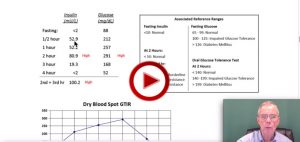Reversing – Removing Plaque from Your Arteries
The same plaque which forms on your teeth will, over the years, coat the arteries and the pathways within the brain.
Strokes are generally from plaque or from a blood clot. Depending on the genetic biomarkers or gene predetermination, you can maintain a good diet and lifestyle (including exercise) and still have: high plaque, diabetes, atrial (heart) fibrillation and high blood pressure.
(A study sheds light on the influences of genetics on why some type 2 diabetics are at high risk for developing Alzheimer’s disease.) source: https://www.sciencedaily.com/releases/2015/07/150716161054.htm
The combination of sugar and carbohydrates forms plaque on the teeth and also in arteries and build up in the brain veins and capillaries. This condition can lead to a stroke.
Your Arteries With & Without Olive Oil
Notes from the video (left):
- A Cardiovascular Risk Assessment is not complete until and unless a Coronary Calcium Score is performed (CIMT Carotic Intima Medium Test) see: (https://www.radiologyinfo.org/en/info.cfm?pg=carotid-intima ) Genes: -9p21 contributes a predisposition of several heart disease problems like heart attack and stroke along with diabetes/ 4q25 forth chromosome - predisposition to an atrial fib gene
- Check and monitor Artery age
- ACE inhibitors (Angiotensin-converting-enzyme inhibitors) like Statins Crestor reduced the dosages to: 2.5mg 2 times/week
Book: Beat the Heart Attack Gene
Notes from the video (left):
- Over half the US population (49-45%) has pre-diabetes or diabetes
- If you use the Kraft test, there will be over 65% with pre-diabetes or diabetes
- "Those with cardiovascular disease not identified with diabetes . . . are simply undiagnosed." Dr. Joseph R. Kraft
- Someone with an extended (middle belly) is generally considered to be diabetic. Middle belly video segment
ABOUT DR. BREWER: Dr. Brewer started as an Emergency Doctor. After seeing too many preventable heart attacks, he went to Johns Hopkins to learn Preventive Medicine. While there, he went on the run the post-graduate training program (residency) in Preventive Medicine. From there, he made a career of practicing and managing preventive medicine and primary care clinics. His later role in this area was Chief Medical Officer for Premise, which has close to 1,000 primary care/prevention clinics.
He was also the Chief Medical Officer for MDLIVE, the second largest telemedicine company. More recently, he founded PrevMed, a heart attack, and stroke prevention clinic. At PrevMed, we focus on heart attack, stroke, and cognitive decline. We serve patients who have already experienced an event as well as those who have not developed a diagnosis or event.
Dr. Brewer provides services via telemedicine or in person if you're in the Lexington, KY area. We find a lot of undiagnosed Pre-Diabetes or Insulin Resistance. Treating unrecognized risk factors like Pre-Diabetes allows reduction of risk and prevention of disease.
The CAC Test For Your Heart: Find Out Your Score
The test is known as the coronary artery calcium (CAC) test. It is performed by taking an ultrafast computerized tomogram (CT) scan of your chest. The CT scanner needs to be “ultrafast” so that it can take clear pictures of your beating heart.
The CAC test measures the amount of calcium that has built up along the inner wall of the coronary arteries in your heart. Results are recorded as numeric score. The higher your score, the more calcium you have. The more calcium, the greater the amount of cholesterol buildup in your heart arteries, which is what causes heart attacks. In general, a zero score means you have no calcium and are at low risk of having a heart attack in the next several years, while scores above 100 are worrisome and should be followed up by a visit to your doctor. (The exact interpretation should be done by your doctor as a score of 25 in a 45-year-old is a major concern, while a score of 150 in an 85-year-old may not be).
Coronary artery calcium tests are available in most major metropolitan areas for $100 to $350. The test takes less than 5 minutes and doesn’t require a doctor’s prescription. A few insurance companies will pay for this test, but most (including Medicare) do not.
Men should consider getting a baseline CAC test at 45 years of age and women at 55. If you have a family history of heart disease, men should get their baseline test at 40 and women at 50. If anyone in your family suffered a heart attack at a young age, say their 30s, you may want to get your scan in your 30s.
I am amazed that so few physicians recommend coronary artery calcium screening to their patients. But, you don’t need to wait for your doctor’s recommendation (although you should discuss the results with them.) Take charge of your health, find out you CAC and protect yourself from our leading cause of death. source




